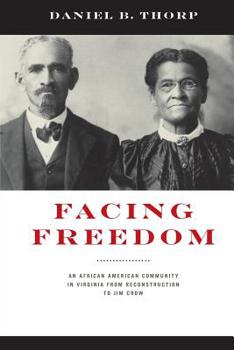Facing Freedom: An African American Community in Virginia from Reconstruction to Jim Crow
(Part of the The American South Series Series)
Select Format
Select Condition 
Book Overview
The history of African Americans in southern Appalachia after the Civil War has largely escaped the attention of scholars of both African Americans and the region. In Facing Freedom, Daniel Thorp relates the complex experience of an African American community in southern Appalachia as it negotiated a radically new world in the four decades following the Civil War. Drawing on extensive research in private collections as well as local, state, and federal records, Thorp narrates in intimate detail the experiences of black Appalachians as they struggled to establish autonomous families, improve their economic standing, operate black schools within a white-controlled school system, form independent black churches, and exercise expanded--if contested--roles as citizens and members of the body politic. Black out-migration increased markedly near the close of the nineteenth century, but the generation that transitioned from slavery to freedom in Montgomery County established the community institutions that would survive disenfranchisement and Jim Crow. Facing Freedom reveals the stories and strategies of those who pioneered these resilient bulwarks against the rising tide of racism.
Related Subjects
History




